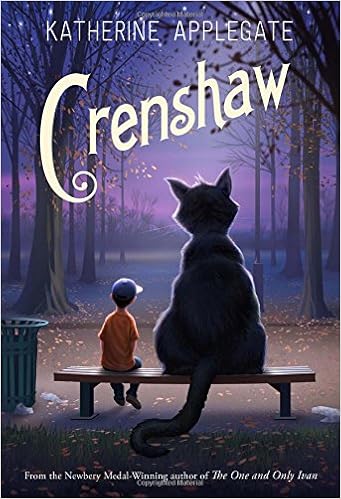 Crenshaw
CrenshawKatherine Applegate
Feiwel & Friends, 2015 256 pgs.
Grades 4-6
Realistic Fiction
Ten-year-old Jackson, his parents, sister, and dog have seen hard times. After Dad was diagnosed with Multiple Sclerosis and Mom was laid off, the family lost their house and spent a summer living in the van. This is when Crenshaw first entered Jackson's life. Crenshaw is a large imaginary friend/cat, who can talk and helps Jackson when life gets rough. Crenshaw disappears as the family moves into an apartment and life seems to improve. Slowly, times get rough again. Fast forward to the present: Jackson's family is in jeopardy of again living in the van. Jackson is now older, has a best friend, and can pay better attention to adult problems. Crenshaw shows back up, taking a bubble bath, bigger than he was before, but still willing to help Jackson out. Jackson feels frustrated that he has no control over the situation, responsible for his little sister who depends on him, and dread of having to move back to the car. Talking to his best friend Marisol helps, as does Crenshaw's companionship, which pushes him to the right decisions, even when they aren't the easy ones. A plan to run away finally brings Jackson's fears to his parent's realization after which they begin to alleviate them. The books ends with a temporary solution for the family and a feeling of hope.
What do you do when you can't trust the adults in your life to keep you safe and secure? This is a problem facing many young people in America today. Jackson's family is suffering as a result of illness and budget cuts to school music programs, but even more families are struggling as a result of addiction, abuse, and the cycle of poverty. Jackson's family seems normal on the outside, but they are fighting to survive day to day. The family must sell off their possessions and work a series of part-time just to get by. Jackson, who is aware of the family's troubles, but is not brought into the conversation in any way or able to fix them, feels completely powerless. Enter Crenshaw, who offers friendship, companionship, a sounding board, and Jackson's conscience. Applegate honestly portrays the hopelessness of Jackson's situation and the realities of homelessness for families. The presence of Crenshaw lightens-up what could become a very difficult book for kids to process. Just as Crenshaw helps Jackson to cope with his life, he helps the reader to enjoy a book about a very difficult situation. I loved this book. My heart broke for Jackson. I understood the problems of his parents, but found them very frustrating myself. I wanted them to be honest earlier with Jackson, because not knowing is often scarier for kids than the truth. Dad's stubbornness about getting help was exasperating, as was Mom's reluctance to override him. And why did they still have a dog? The dog was a puppy the first time they became homeless. It would seem to me that relocating the puppy would be natural first step before life in a van. Although not overly happy, the book ends with an unrealistically lucky break for the family. Young readers need a hopeful ending for peace and closure, even if it is not necessarily true to life. Kids living in safe environments will do well to read this story in order to increase their empathy for others. Those many young people living in bad situations will find hope in these pages and possible discover their own Crensaw to help them get through the tough times that feel out of their control. Through the recent popularity of the movie Inside Out, as well as last year's Caldecott winner The Adventures of Beekle, imaginary friends are hot again, and Crenshaw is as likable as they come.
No comments:
Post a Comment